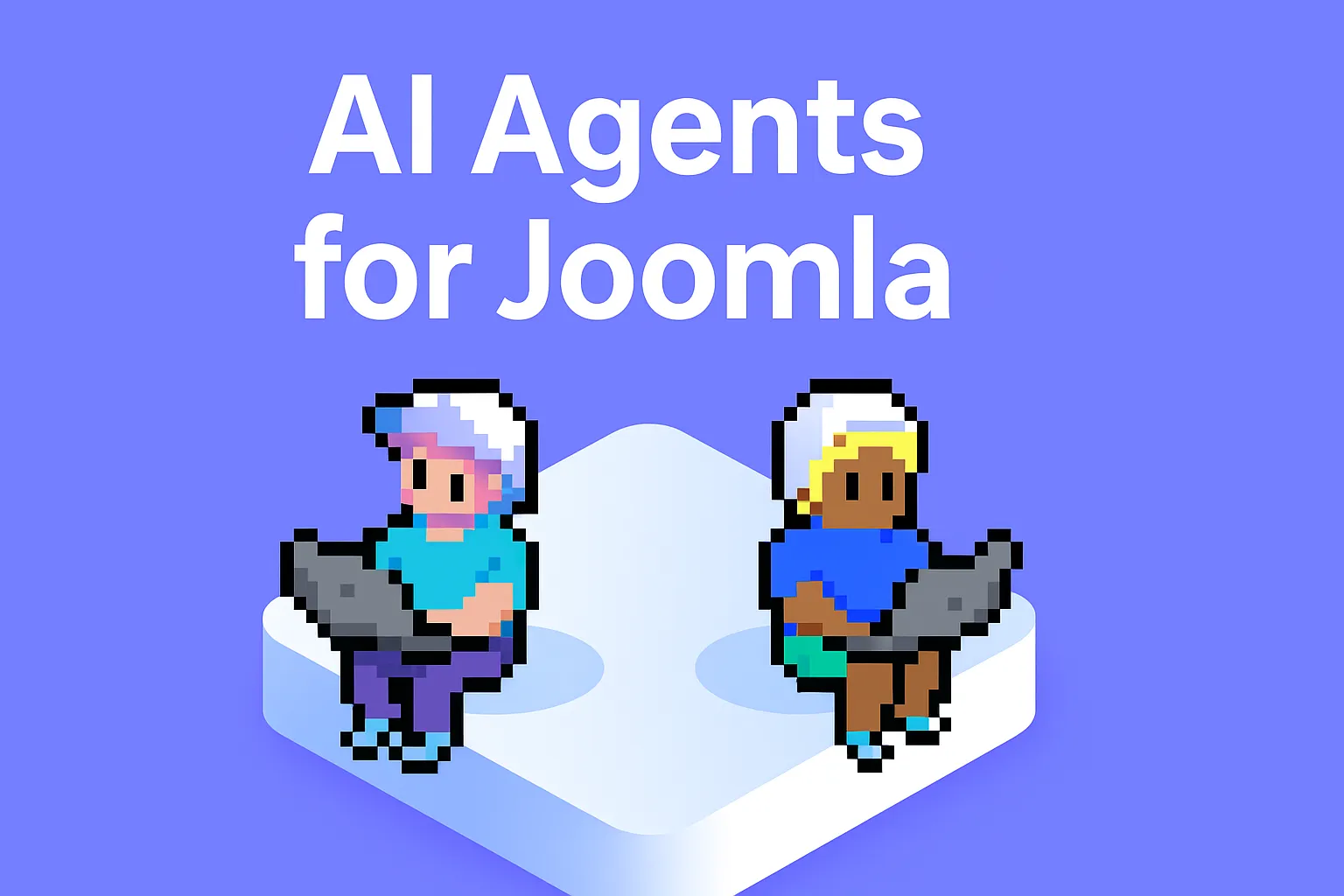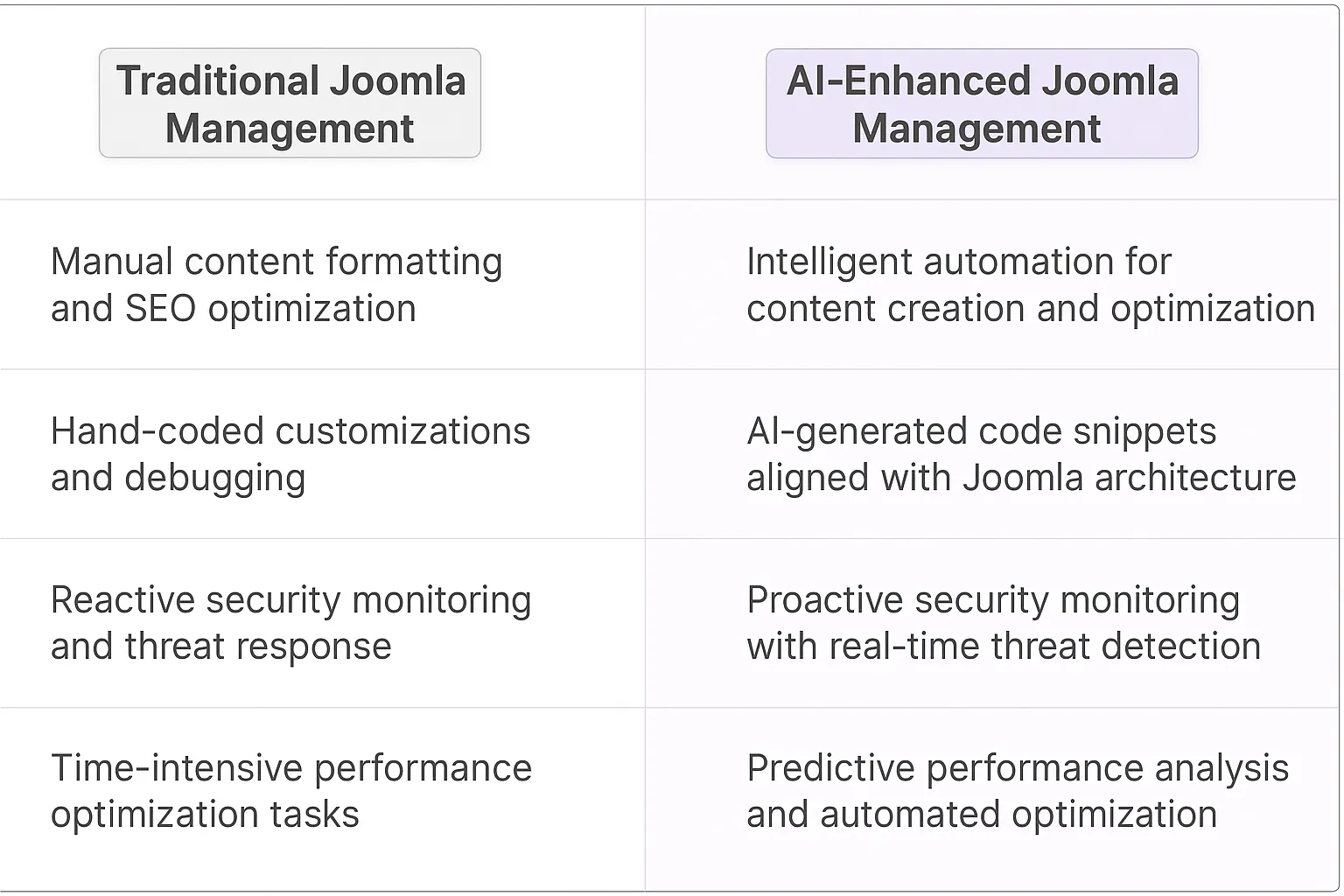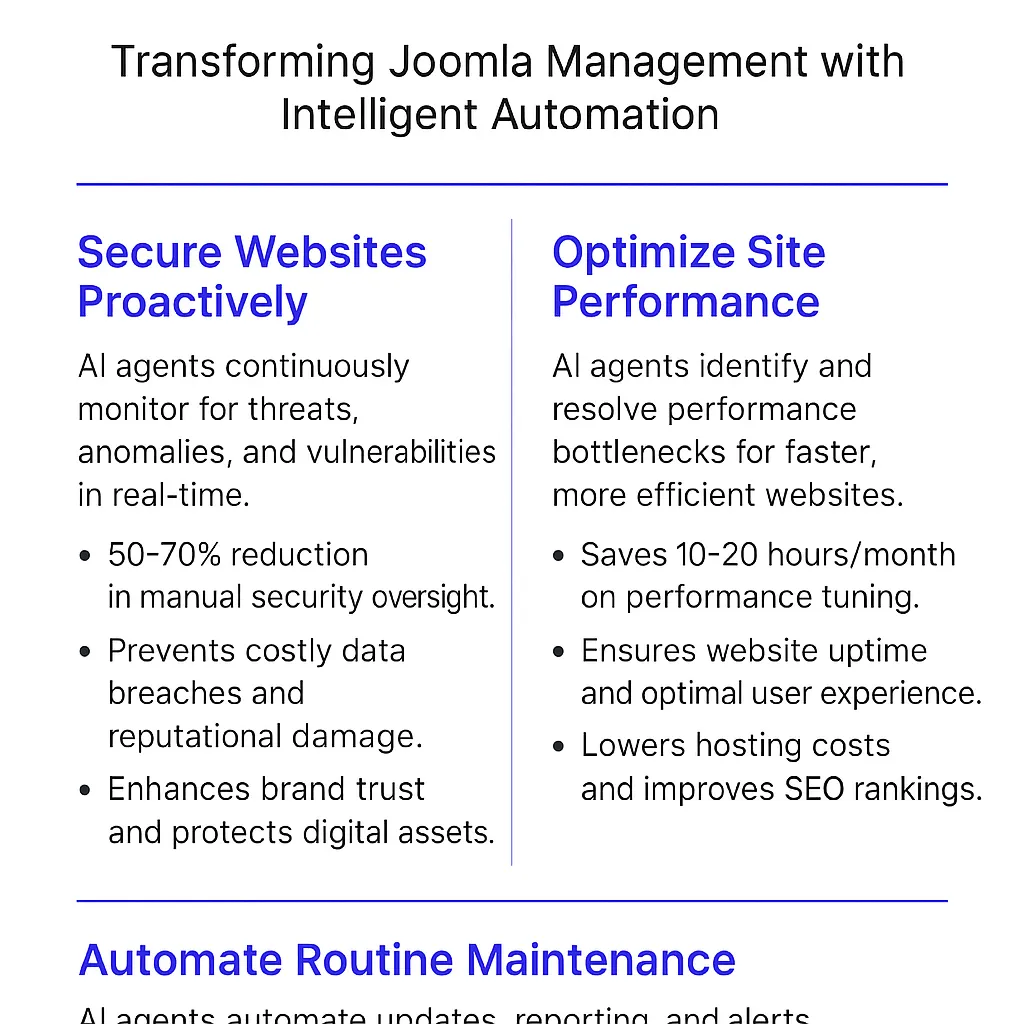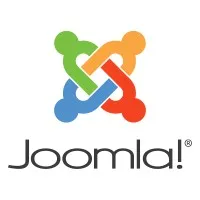Joomla
Understanding Joomla's Core Platform
Joomla stands as one of the web's most powerful open-source content management systems, powering millions of websites worldwide. The platform provides a robust foundation for building everything from personal blogs to enterprise-level applications, with a flexible architecture that supports extensive customization through its component, module, and plugin system.
Key Features of Joomla
- Modular architecture enabling extensive customization
- Built-in multilingual capabilities
- Advanced user management and access control
- Extensive template system for design flexibility
- Rich ecosystem of extensions and plugins
- Strong security features and regular updates

Benefits of AI Agents for Joomla
What would have been used before AI Agents?
Managing a Joomla website traditionally required extensive manual effort. Content creators spent hours formatting articles, developers had to hand-code customizations, and site administrators juggled multiple tasks like security monitoring and performance optimization. The standard workflow involved repetitive tasks, constant documentation checks, and frequent troubleshooting sessions that consumed valuable time.
What are the benefits of AI Agents?
AI Agents transform Joomla website management through intelligent automation and proactive support. These digital teammates handle complex tasks that previously required significant human intervention:
- Smart Content Management: AI Agents analyze content patterns and automatically suggest optimal formatting, meta descriptions, and SEO improvements while maintaining Joomla's content structure.
- Code Generation and Debugging: When developers need to create custom modules or components, AI Agents generate code snippets that align with Joomla's architecture and best practices, reducing development time by 60-70%.
- Security Enhancement: AI Agents continuously monitor website activity, identifying potential vulnerabilities before they become threats. They analyze traffic patterns and user behaviors to detect suspicious activities in real-time.
- Performance Optimization: Through predictive analysis, AI Agents identify performance bottlenecks and suggest specific optimizations for database queries, caching configurations, and server resources.
- Extension Management: AI Agents evaluate extension compatibility, suggest updates, and predict potential conflicts before they impact site functionality, maintaining a healthy Joomla ecosystem.
The integration of AI Agents in Joomla creates a more efficient, secure, and scalable content management system. Website owners can focus on strategic decisions while their digital teammates handle the technical complexities of site management.

Potential Use Cases of AI Agents with Joomla
Content Management Processes
AI Agents transform how teams handle Joomla content management through intelligent automation. The agents can analyze existing content structure, suggest optimal category hierarchies, and maintain consistent metadata across articles. They monitor content performance metrics and provide data-driven recommendations for content optimization.
Technical Support and Troubleshooting
When developers encounter Joomla-specific issues, AI agents tap into vast knowledge bases of common problems and solutions. They can diagnose extension conflicts, identify database optimization opportunities, and provide step-by-step guidance for resolving complex technical challenges.
Extension Management
AI agents excel at monitoring Joomla extensions, checking compatibility between versions, and flagging security vulnerabilities. They can analyze extension performance impact and suggest optimal configurations based on site requirements and traffic patterns.
Template Customization
The design process becomes more efficient as AI agents assist with template modifications. They can generate CSS adjustments, optimize responsive breakpoints, and ensure accessibility standards are met across template variations.
Security Monitoring
AI agents continuously scan Joomla installations for potential security threats. They analyze access logs, identify suspicious behavior patterns, and provide real-time alerts for unauthorized access attempts or potential vulnerabilities.
Performance Optimization
Site performance receives constant attention from AI agents that monitor server response times, database query efficiency, and caching effectiveness. They provide specific recommendations for improving load times and overall site speed.
Content Creation Support
AI agents assist content teams by suggesting SEO improvements, checking for broken links, and ensuring content adheres to brand guidelines. They can also help generate meta descriptions and optimize content structure for better search engine visibility.
User Experience Enhancement
Through analysis of user behavior and interaction patterns, AI agents identify opportunities to improve site navigation and content accessibility. They provide insights for optimizing menu structures and enhancing the overall user journey.
These AI capabilities fundamentally shift how teams manage and optimize Joomla websites, enabling more strategic focus while handling routine tasks with precision and efficiency.

Industry Use Cases
AI agents are transforming how organizations leverage Joomla across different sectors, creating new possibilities for content management and web development. The integration of AI within Joomla's ecosystem enables teams to tackle complex challenges with greater precision and creativity. From e-commerce to education, these digital teammates are reshaping how businesses approach their web presence and user engagement strategies.
What makes AI agents particularly compelling for Joomla users is their ability to adapt to specific industry requirements while maintaining the platform's core strengths. They're not just tools - they're collaborative partners that understand the nuances of different business models and can execute tasks with industry-specific context in mind.
The real power comes from how these AI agents handle the unique challenges each sector faces. Whether it's managing multilingual content for global enterprises or optimizing product catalogs for retail sites, they bring a level of sophistication that transforms how organizations operate within the Joomla environment.
Education Industry: AI-Enhanced Learning Management with Joomla
Educational institutions face mounting pressure to deliver personalized learning experiences while managing massive amounts of content and student data. Joomla AI agents transform how universities and schools handle their digital infrastructure by bringing intelligence to content management and student engagement.
Take a mid-sized university managing over 200 courses across multiple departments. Their Joomla-powered learning portal previously required manual updates from dozens of faculty members and administrators. By implementing AI agents, the system now automatically:
- Analyzes student interaction patterns to surface the most relevant course materials
- Tags and categorizes uploaded content using natural language processing
- Generates course summaries and study guides from lecture materials
- Identifies gaps in curriculum coverage across departments
- Provides intelligent search capabilities across all educational resources
The real power emerges when these capabilities compound. For example, when a professor uploads new lecture slides, the AI agent automatically creates meta descriptions, suggests related readings, and notifies students who previously engaged with similar topics. This creates a self-improving loop where each interaction makes the system more valuable.
The metrics tell the story: Universities using Joomla AI agents report 40% faster content organization, 60% reduction in administrative tasks, and most importantly - a 25% increase in student engagement with course materials. These aren't just incremental improvements - they represent a fundamental shift in how educational institutions manage and deliver digital learning experiences.
The network effects are particularly powerful in education, where more usage generates better recommendations and more personalized learning pathways. As AI agents learn from interactions across courses and departments, they create an increasingly valuable knowledge graph specific to each institution's needs.
Healthcare Industry: AI-Powered Patient Care Management in Joomla
Healthcare providers are discovering that Joomla AI agents radically improve how they deliver patient care and manage medical information. The shift from static content management to intelligent, dynamic systems is creating measurable impacts across hospital networks and clinics.
A regional healthcare network with 12 locations demonstrates the network effects of AI-enabled content management. Their Joomla implementation now:
- Automatically updates treatment protocols across facilities based on new medical research
- Personalizes patient portals by analyzing individual health records and upcoming appointments
- Maintains HIPAA compliance while intelligently routing patient inquiries
- Synthesizes medical documentation to create patient-friendly educational materials
- Coordinates cross-departmental scheduling based on resource availability and patient needs
The compounding benefits become clear when examining patient engagement metrics. When patients interact with their personalized portal, the AI agent learns their communication preferences, health concerns, and typical questions. This creates increasingly relevant experiences that drive better health outcomes.
The data shows dramatic improvements: Healthcare providers using Joomla AI agents report 45% faster response times to patient inquiries, 30% reduction in missed appointments, and a 50% increase in patient portal engagement. These metrics directly translate to better patient care and more efficient operations.
The growth loops are particularly powerful in healthcare settings. As more patients and providers interact with the system, the AI agents build deeper understanding of common questions, concerns, and patterns. This creates a continuously improving knowledge base that benefits the entire healthcare network while maintaining strict privacy standards.
This represents a fundamental evolution in healthcare content management - from static information delivery to intelligent, personalized patient care coordination. The network effects compound over time, making the system increasingly valuable to both providers and patients.
Considerations for Joomla AI Integration
Implementing AI capabilities within Joomla environments requires careful planning and strategic decision-making. The open-source nature of Joomla presents unique opportunities but also introduces specific complexities that need addressing.
Technical Challenges
The Joomla architecture, while robust, wasn't originally designed with AI integration in mind. Development teams often encounter hurdles with API compatibility, especially when connecting modern AI models to legacy Joomla installations. Database schema modifications may be necessary to store AI-generated content and user interaction data effectively.
Memory management becomes critical when running AI processes alongside Joomla's core functions. Sites need proper server configurations to handle increased computational loads without impacting performance. Cache management strategies require updates to accommodate AI-driven dynamic content generation.
Operational Considerations
Content workflows need restructuring to incorporate AI capabilities seamlessly. Editorial teams must develop new processes for reviewing and validating AI-generated content before publication. Training staff to effectively use AI tools within Joomla requires dedicated resources and time investment.
Security protocols demand enhancement when integrating AI systems. Teams need to implement additional layers of authentication and monitoring to protect against potential vulnerabilities introduced by AI components. Regular security audits become more complex with the addition of AI functionality.
Resource Requirements
Server infrastructure often needs upgrading to support AI operations. Organizations must account for increased bandwidth usage and storage requirements, particularly when handling machine learning models and training data. Budget planning should include ongoing costs for AI API calls and potential custom development needs.
The development team's skill set may need expansion to include AI expertise alongside traditional Joomla development knowledge. This might involve hiring specialists or investing in training programs for existing staff members.
The Future of AI-Enhanced Joomla Management
The marriage of AI Agents and Joomla represents a significant evolution in content management system capabilities. Organizations implementing these digital teammates are seeing measurable improvements in efficiency, security, and user engagement. The network effects of AI in Joomla create compounding benefits - as these systems learn and adapt, they become increasingly valuable assets for organizations across sectors. The key to success lies in thoughtful implementation that considers technical requirements, security protocols, and team capabilities. Moving forward, AI Agents will continue to expand what's possible within the Joomla ecosystem.













